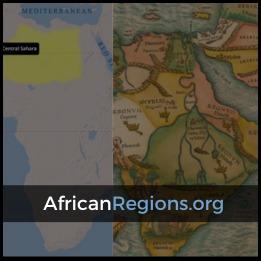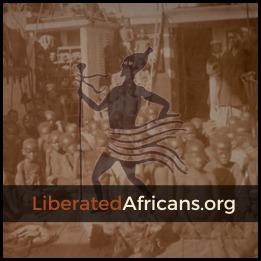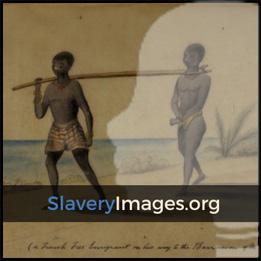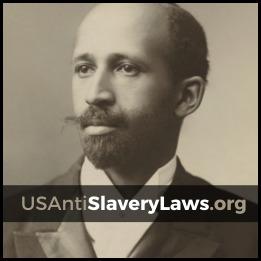Resources
Digital Publications
AfricanRegions.org

African Regions is a teaching/research tool is directed at historical periods between circa 1500 and 1900, for which there are few inland maps other than depictions often based on incomplete and inaccurate information drawn up from hearsay and speculation. The aim is to provide an introductory geographic understanding of the continent and its peoples from perspectives rooted in African and African diaspora history. They are primarily devised as a neutral guide to the continent with labels that are easy to translate and input as categorical data. AfricanRegions.org is helpful for teaching this continent’s complex history in broad, regional terms. It centers on a geographic hierarchy that divides Africa into six broad regions that are sub-divided into 34 subregions, including major offshore islands. They were created following rigorous academic standards and collaboration. The regional labels attempt to avoid terms that might be confused with ethnolinguistic groups, the language of slave traders, colonial places, modern countries, and other biases.
LiberatedAfricans.org

This research database, digital archive and learning resource provides for an unprecedented analysis of the contradiction of abolition as both a humanitarian effort and a crime against humanity. Between 1800 and 1920, abolition advanced legal mechanisms to disguise another type of slavery, which was known paradoxically as Liberated Africans. Under the pretense of freedom, Portugal, France, Britain, Spain, Brazil, Germany, the United States, the Netherlands, the Ottoman Empire, and various Latin America republics involuntarily indentured and conscripted people for terms lasting several years. LiberatedAfricans.org is dedicated to the legacies of 700,000 people. Alongside millions of indentured Europeans and Asians, Liberated Africans were settled into various societies transitioning out of a dependency on chattel slavery. This digital publication includes an anti-slavery legislation archive, and over 5,500 cases involving the departure, capture, indenturing, and settlements. These case files are gradually being attached to a growing digital archive.
SlaveryImages.org

This educational resource is a two-part website created for teachers, researchers, students and the general public. It exists to assist anyone interested in visualizing the experiences of Africans and their descendants who were enslaved and transported to slave societies around the world. This website is a digital archive for hundreds of historical images, paintings, lithographs, and photographs illustrating enslaved Africans and their descendants before c. 1900. This visual record has been decades in the making, and it continues to grow. To advance common aims, Slavery Images has partnered and aligned with the mission of UNESCO's Slave Route Project: Resistance, Liberty, Heritage.In the 1980s, Jerome S. Handler, a professor of Anthropology and pioneer in the digital humanities, began amassing photo slides of historical images depicting enslaved Africans and their descendants. By the late 1990s, Handler organized their digitization, generated metadata and put them online with the help of Michael Tuite. For more than a decade, SlaveryImages.org resided on servers at the Virginia Humanities (formerly Virginia Foundation for the Humanities); and the website operated in partnership with the University of Virginia Library. In 2018, following Handler's retirement, the website migrated to the Digital Slavery Research Lab.
USAntiSlaveryLaws.org

This digital reference resource recreates William Edward Burghardt Du Bois' seminal work, The Suppression of the African Slave Trade to the United States of America, 1638-1870, initially published in 1896. Based on Du Bois’ thesis at Harvard, this book chronologically assesses a collection of federal and state legislation enacted to suppress and abolish the slave trade in the United States, the Atlantic world, and beyond. The records found herein illuminate the long and contested history of the suppression of the African slave trade to the United States. The primary sources in this digital archive demonstrate the centrality of the slave trade to the trajectory of U.S. domestic and foreign policy. This collection includes duty acts, prohibitions, appropriations, constitutions, and colonial, state, and national statutes. However, the legislation alone does not tell the complete story. The archive also contains presidential and diplomatic correspondence and speeches regarding the processes of enacting anti-slavery treaties. This website is co-directed by Chloe Zehr and Henry B. Lovejoy.
Published Datasets
- Henry B. Lovejoy, "Registered Liberated Africans." https://doi.org/10.7910/DVN/4DA5DP, Harvard Dataverse, V1, 2024.
- Henry B. Lovejoy, "Global Survey of "Liberated African" Cases during the Suppression of the Slave Trade from Africa, 1800-1920." https://doi.org/10.7910/DVN/ZL6R2A, Harvard Dataverse, V1, 2023.
- Henry B. Lovejoy, "Maritime Blockade of the Slave Trade, 1800-1900." https://doi.org/10.7910/DVN/ZNE4SK, Harvard Dataverse, V1, 2023.
- Henry B. Lovejoy, Brenna Bythewood, Tiffany Beebe, Ann Chapman Terrill, Alexander Gillette, Olivia Hart, Ian Hogg, Kathleen King, Alexander Langer, Travis May, Megan Tocci, and Chloe Zehr, "Catalogue of Anti-Slave Trade Legislation in Global Perspective", https://doi.org/10.7910/DVN/6OZDQC, Harvard Dataverse, V1, 2023.
- Karl Grossner, and Henry B. Lovejoy, "Regionalization of Africa as a Controlled Vocabulary for Data Analysis." https://doi.org/10.7910/DVN/9YIWBJ, Harvard Dataverse, V1, 2022.
- Henry B. Lovejoy, "Replication Data for: A Modelling Strategy to Estimate Conditional Probabilities of African Origins: The Collapse of the Oyo Empire and The Transatlantic Slave Trade, 1817–1836." https://doi.org/10.7910/DVN/TALYQW, Harvard Dataverse, V1, 2013-2022.
- Henry B. Lovejoy, "Lucumí Cabildos and "Liberated Africans" in Havana, Cuba." https://doi.org/10.7910/DVN/FGBH4Q, Harvard Dataverse, V1, 2012.
- Henry B. Lovejoy, "Registers of "Liberated Africans" of the Havana Slave Trade Commission, 1824-1841." https://doi.org/10.7910/DVN/8RWXO4, Harvard Dataverse, V1, 2010.

